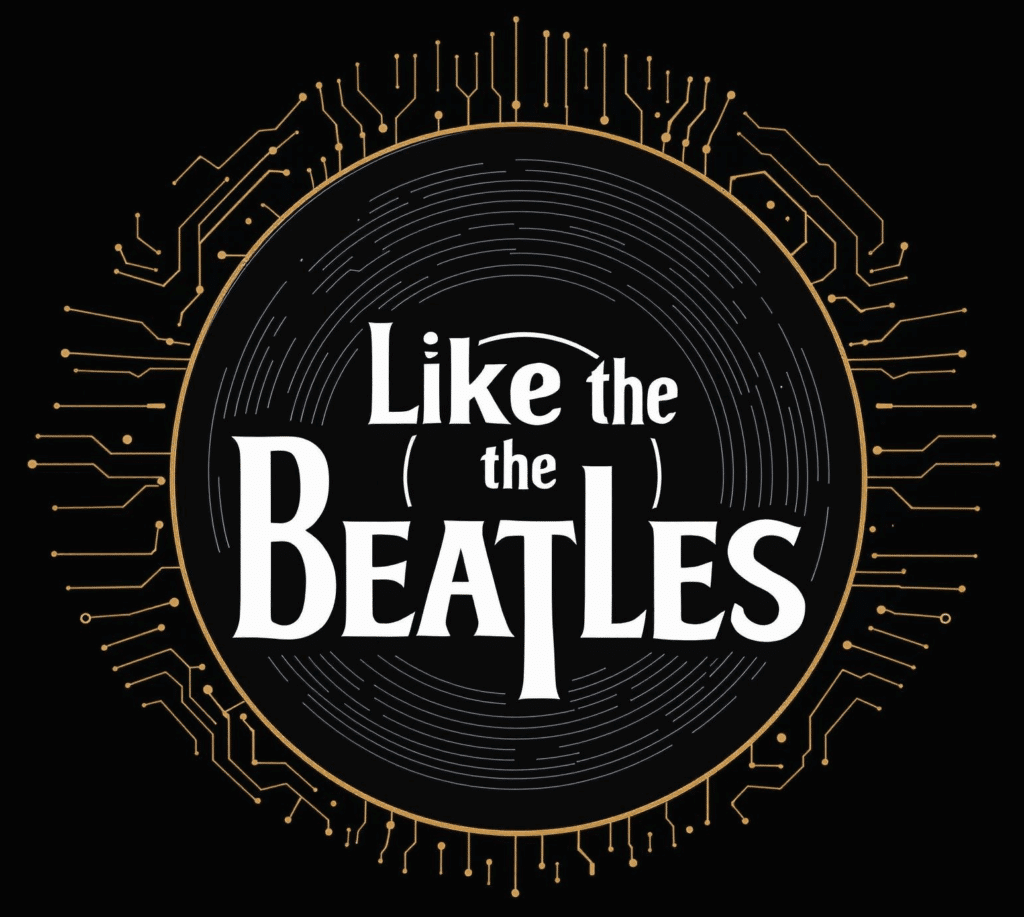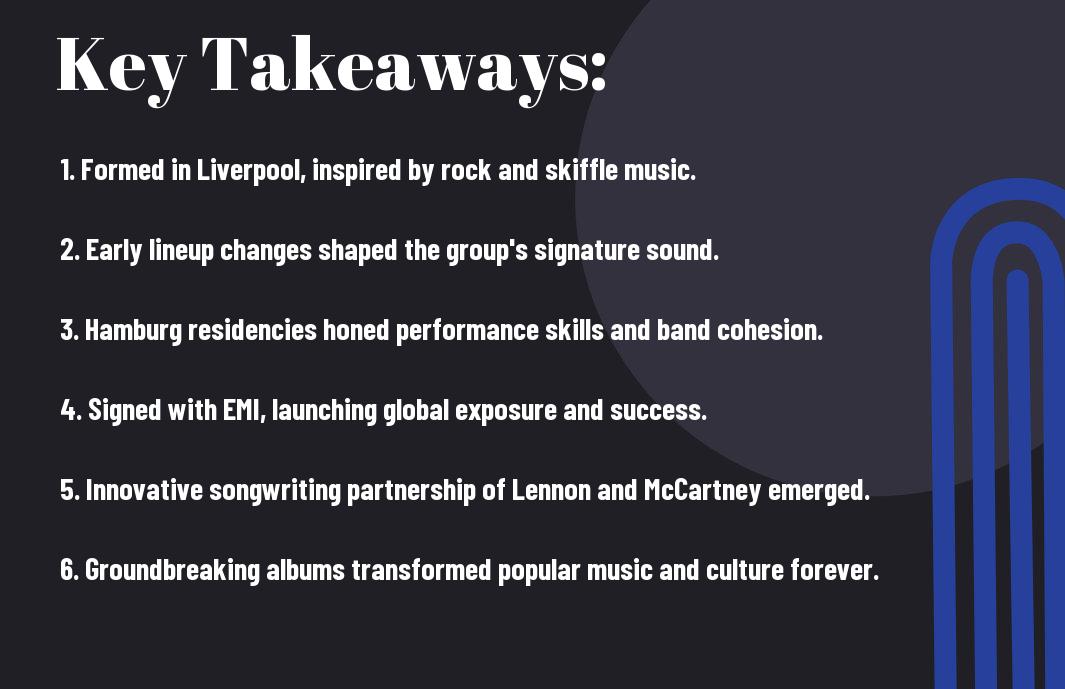There’s a fascinating journey that transformed four Liverpool lads into the global icons we all know today as The Beatles. In this blog post, I’ll guide you through the ten imperative steps that marked their path from humble beginnings to unstoppable stardom. You’ll discover how their unique sound, innovative approach, and relentless determination helped them become one of the most influential bands in history. Let’s investigate the key moments that defined their spectacular rise in the music industry and shaped the cultural landscape of an entire generation.
Early Formation of the Band
Your journey into the early days of The Beatles begins with their formative years, which laid the foundation for their iconic status. It was during this period that the band members discovered their shared passion for music, setting them on a path to become one of the most influential music groups in history. Understanding how they evolved from their humble beginnings to a global phenomenon provides insight into their unique dynamic and creativity.
The Quarrymen and Initial Lineup
Quarrymen was the name of the skiffle group founded by John Lennon in 1956, which featured fellow student Ivan Vaughan and, eventually, Paul McCartney. This early lineup marked the inception of what would become The Beatles, consisting primarily of friends who shared a love for rock and roll. The group’s sound began to take shape as they performed in local venues, capturing the attention of audiences and sowing the seeds for their future success.
Transition to The Beatles
Along the way, the Quarrymen underwent a significant transformation that ultimately led to their rebranding as The Beatles. This change took place when they welcomed George Harrison into the fold and solidified their lineup with drummer Ringo Starr, formerly of Rory Storm and the Hurricanes. As they transitioned, they started to embrace new sounds and styles, quickly distinguishing themselves in the bustling Liverpool music scene. The arrival of Brian Epstein as their manager in 1961 marked a turning point, effectively guiding their image and catapulting them toward mainstream success, leading to their legendary status.
This pivotal phase in their history illustrated the strength of collaboration and adaptability among the band members. With each change in lineup, they took the opportunity to reinvent themselves, exploring various genres and musical influences. Their unique blend of harmonies, melodies, and innovative songwriting garnered attention beyond Liverpool, leading them to sign with EMI Records in 1962. The collaboration with producer George Martin was particularly significant, as it allowed them to further refine their sound, paving the way for the incredible journey that was to follow. It was the perfect storm of talent, ambition, and the willingness to evolve as artists that truly marked the transition from the Quarrymen to The Beatles.
Influences and Musical Development
While The Beatles blossomed into a musical phenomenon, their journey was deeply influenced by an array of artists and genres. From rock and roll to folk, each element contributed intricately to their distinctive sound. This eclectic mix helped them to evolve and experiment, establishing an enduring legacy that continues to resonate in the music world today.
Key Influences in Their Sound
For The Beatles, influences came from diverse sources like Elvis Presley, Chuck Berry, and the innovative sounds of American rhythm and blues. These early icons not only shaped my perception of music but also ignited a desire to create and innovate, setting the foundation for their future hits.
Songwriting Evolution
Before they became global icons, The Beatles underwent significant changes in their songwriting approaches. Initially, their tunes featured straightforward structures and catchy melodies, but as they matured, so did their lyrics, often reflecting personal experiences and societal themes.
Development in their songwriting can be traced through their discography, showcasing an impressive transformation from simple, catchy pop to complex and introspective compositions. Each album represented a new chapter in their evolution, marked by experimentation with different musical styles and lyrical depth. Songs like “Yesterday” revealed a introspective side, while “Sgt. Pepper’s Lonely Hearts Club Band” showcased their artistic innovation. This continuous exploration not only defined their sound but also paved the way for future generations of musicians, making your understanding of their journey all the more enriching.
Breakthrough Moments
To understand the meteoric rise of The Beatles, we must examine their pivotal breakthrough moments. These key events set the stage for their legendary status and showcased their undeniable talent. From small gigs to massive acclaim, each milestone contributed to their evolution as a band that would change music history forever.
The Cavern Club and Early Performances
Below the bustling streets of Liverpool, The Cavern Club served as the launching pad for The Beatles’ early performances. It was here that they honed their craft, captivating audiences with their energy and charisma. Playing lunchtime shows and late-night gigs, they built a dedicated following, making the club a hotspot for rock and roll enthusiasts.
“Love Me Do” and Chart Success
Between intense rehearsals and passionate performances, The Beatles released their debut single, “Love Me Do,” in 1962. This track not only marked their entry into the music scene but also showcased their unique blend of pop and rock. Soon after, the song climbed the charts, showing their potential to reshape the musical landscape.
Club owners and music executives started to take notice of The Beatles as their sound captivated listeners across the UK. “Love Me Do” reached number 17 on the charts, which was a remarkable feat for a debut single. This marked a turning point in their journey, boosting their confidence and securing their position in the industry. The success of this song opened doors to further opportunities, leading to more recording deals and performances. With a fresh sound and undeniable charm, The Beatles were poised to take the world by storm.
The Expansion of Fame
After their initial success, The Beatles quickly transformed into a cultural phenomenon, embracing the challenges that came with fame. As I probed deeper into their story, I found The 10 crucial Beatles books incredibly enlightening, shedding light on their meteoric rise and the impact they had worldwide.
Beatlemania in the UK
Above all, Beatlemania took the UK by storm in the early 1960s, creating a frenzied wave of excitement. Fans flocked to concerts, leading to sold-out shows and an atmosphere charged with palpable energy. I can only imagine the thrill of being part of such an iconic moment in music history.
The American Invasion: Ed Sullivan Show
Around 1964, The Beatles made their mark on American television, captivating audiences during their performance on The Ed Sullivan Show. This monumental event marked the beginning of their dominance in the U.S. music scene, with over 73 million viewers tuning in
American television had never seen anything quite like The Beatles on The Ed Sullivan Show. The band’s performance not only brought a surge of adoration but also led to a shift in American pop culture. This historic appearance ignited a passion for British music in the U.S., leading to an explosion of interest in rock bands. The Beatles’ arrival created a shift in youth culture, paving the way for a new era of music and youthful rebellion. I believe this was a defining moment that shaped the music landscape forever.
Landmark Albums and Cultural Impact
For I can argue that The Beatles’ remarkable journey through landmark albums not only shaped their musical legacy but also left an indelible mark on popular culture. Their innovative sound, lyrical depth, and experimentation with different genres influenced countless artists and sparked cultural movements that resonate today. The Beatles began to redefine the parameters of music, pushing the boundaries of what was possible and setting the stage for generations to come.
Rubber Soul to Sgt. Pepper’s
Rubber Soul heralded a transformative period for The Beatles, showcasing their evolution as songwriters and musicians. With tracks that examined into personal and introspective themes, they captivated audiences, paving the way for the groundbreaking album, Sgt. Pepper’s Lonely Hearts Club Band. This album not only redefined the concept of an album as a cohesive work of art but also revolutionized studio production techniques, solidifying The Beatles’ experimental reputation.
The Beatles as Cultural Icons
To truly understand The Beatles, one must recognize their status as cultural icons. Their influence extended far beyond music; they became symbols of a generation, championing ideals of love, peace, and social change. The Beatles’ unique style and groundbreaking music created a cultural phenomenon, inspiring fashion, art, and even political movements during the turbulent 1960s. They embodied the spirit of innovation and freedom, leaving an enduring legacy that continues to inspire artists and individuals worldwide.
Landmark albums like “Sgt. Pepper’s” and “Revolver” showcased the band’s unparalleled ability to merge musical artistry with social commentary. Their exploration of complex themes and willingness to challenge traditional norms set them apart from their contemporaries. As they embraced psychedelia and self-expression, they became icons of a broader cultural revolution. The Beatles not only paved the way for future musicians but also fueled movements advocating for peace and love. Their legacy as cultural icons is a testament to their immense impact on our global consciousness.
Challenges and Changes
Unlike many bands, The Beatles faced a myriad of challenges as they evolved from a small group in Liverpool to global icons. These challenges were not just external pressures, such as the demands of fame, but also internal conflicts and shifts in their musical direction that shaped their artistry. As they navigated through these difficulties, the band learned to adapt, ultimately leading to their groundbreaking sound that changed the landscape of popular music.
Internal Conflicts and Lineup Changes
Among the most significant hurdles were the internal conflicts within the band, which threatened their unity. Tensions arose due to differing creative visions, with each member wanting to explore diverse musical paths. Additionally, lineup changes in their early days compelled them to reassess their dynamics and work collaboratively amidst personal disagreements.
The Shift in Musical Direction
Internal struggles also pushed The Beatles to redefine their musical identity. They transitioned from simple pop tunes to more complex, experimental sounds that reflected their personal growth. This shift was marked by their willingness to embrace new influences, leading to albums like *Revolver* and *Sgt. Pepper’s Lonely Hearts Club Band*, where innovative studio techniques and lyrical depth transformed them into cultural icons. Through this evolution, they remained true to their artistic vision, setting a precedent for future generations of musicians.
To sum up, this transformation was not without its risks, but it ultimately positioned The Beatles at the forefront of the music revolution. As they integrated psychedelic influences and diverse genres, they showed a fearless commitment to experimentation. This journey illustrates how significant artistic shifts can emerge from moments of tension and conflict, setting the stage for a lasting legacy that continues to inspire artists today.
Final Years and Legacy
Keep in mind that The Beatles’ journey was not solely defined by their meteoric rise to fame. Their final years as a band were marked by both creative exploration and personal differences, ultimately leading to their disbandment. This shift allowed each member to pursue unique solo careers, resulting in memorable albums and performances that further enriched their artistic identities.
Disbandment and Solo Careers
By the early 1970s, The Beatles had disbanded, prompting members to initiate on individual projects. John Lennon, Paul McCartney, George Harrison, and Ringo Starr each carved out successful careers, experimenting with different musical styles and expressing their distinct artistic visions. This period showcased their talents and allowed them to resonate with audiences in new ways.
Lasting Influence on Music and Culture
Culture deeply reflects The Beatles’ impact on music and society. From their innovative songwriting to their experimentation with sounds and genres, they inspired countless artists and reshaped popular music. In fact, their influence is evident in diverse genres, including rock, pop, and even hip-hop. The band’s iconic style and social messages endured, reaching beyond music to impact fashion, film, and lifestyles worldwide. Their songs fostered a sense of unity, helping to voice the sentiments of a generation and shaping cultural movements that can still be felt today.
Conclusion
As a reminder, the journey of The Beatles from their humble beginnings to global stardom showcases the power of talent, innovation, and resilience. I hope you can draw inspiration from their ten necessary steps, understanding how each phase contributed to their monumental success. Whether you are an aspiring musician or simply a fan, appreciating their evolution can provide valuable insights into your own creative journey. Your dreams can take flight with the right vision and dedication, just as The Beatles did.












